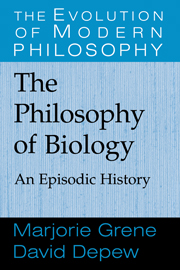Book contents
- Frontmatter
- Contents
- List of Figures
- Notes on Citations and References
- Acknowledgments
- Preface
- 1 Aristotle and After
- 2 Descartes, Harvey, and the Emergence of Modern Mechanism
- 3 The Eighteenth Century I
- 4 The Eighteenth Century II
- 5 Before Darwin I
- 6 Before Darwin II
- 7 Darwin
- 8 Evolution and Heredity from Darwin to the Rise of Genetics
- 9 The Modern Evolutionary Synthesis and Its Discontents
- 10 Some Themes in Recent Philosophy of Biology
- 11 Biology and Human Nature
- 12 The Philosophy of Biology and the Philosophy of Science
- References
- Index
3 - The Eighteenth Century I
Buffon
Published online by Cambridge University Press: 05 June 2012
- Frontmatter
- Contents
- List of Figures
- Notes on Citations and References
- Acknowledgments
- Preface
- 1 Aristotle and After
- 2 Descartes, Harvey, and the Emergence of Modern Mechanism
- 3 The Eighteenth Century I
- 4 The Eighteenth Century II
- 5 Before Darwin I
- 6 Before Darwin II
- 7 Darwin
- 8 Evolution and Heredity from Darwin to the Rise of Genetics
- 9 The Modern Evolutionary Synthesis and Its Discontents
- 10 Some Themes in Recent Philosophy of Biology
- 11 Biology and Human Nature
- 12 The Philosophy of Biology and the Philosophy of Science
- References
- Index
Summary
Introduction
In looking at episodes in our philosophical tradition that bear in various ways on what we now call biological questions – and anticipating what we have come to call the philosophy of biology – we have been dealing so far with figures at the opening and the close of the Aristotelian tradition, a tradition lasting more than 2,000 years. If Descartes wanted to overturn Aristotelian science, he wanted to do so from within a Scholastic environment, and he was speaking to Scholastic readers. However, when we come to Georges-Louis Leclerc, famous in his time as the Comte de Buffon, we enter a different world. Before we look at some of the major features of Buffon's work, we need to specify briefly the most striking novelty in the intellectual climate of his time: that from the last days of Scholasticism, we have moved to a post-Newtonian era. Looming over every area of scientific work, there falls the shadow of “the great Newton.” There were still thinkers in the Aristotelian tradition, such as Buffon's critic Malesherbes (Malesherbes 1798). But, on the whole, Newton was the authority figure to be followed, or perhaps in some ways challenged. In cosmology, Newton, rather than Descartes or Aristotle, commonly served as the starting point for new speculations. When, for example, in his account of the origin of the planets, Buffon invoked an “impulsive force” in addition to gravitation, he was reflecting against a Newtonian background (Buffon, “Proofs of the Theory of the Earth,” OP, p. 1).
- Type
- Chapter
- Information
- The Philosophy of BiologyAn Episodic History, pp. 64 - 91Publisher: Cambridge University PressPrint publication year: 2004

